裕兴新概念第二册笔记(2)
裕兴新概念英语第二册笔记_第2课_课文讲解
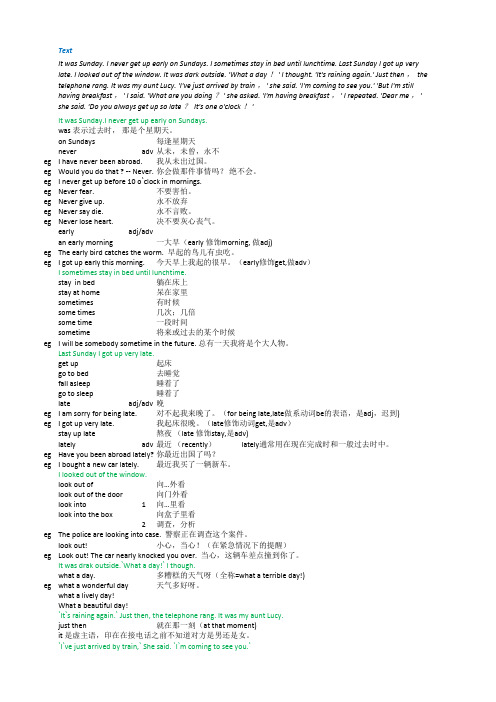
TextIt was Sunday. I never get up early on Sundays. I sometimes stay in bed until lunchtime. Last Sunday I got up very late. I looked out of the window. It was dark outside. 'What a day!' I thought. 'It's raining again.' Just then, the telephone rang. It was my aunt Lucy. 'I've just arrived by train,' she said. 'I'm coming to see you.' 'But I'm still having breakfast,' I said. 'What are you doing?' she asked. 'I'm having breakfast,' I repeated. 'Dear me,' she said. 'Do you always get up so late? It's one o'clock!'It was Sunday.I never get up early on Sundays.was 表示过去时,那是个星期天。
on Sundays每逢星期天never adv从未,未曾,永不eg I have never been abroad.我从未出过国。
eg Would you do that ? -- Never.你会做那件事情吗?绝不会。
eg I never get up before 10 o`clock in mornings.eg Never fear.不要害怕。
裕兴版新概念英语第二册课堂笔记整理L1

新概念第二册BYBYHuang YixiaoIntroduction•学习方法和指导法指•系统性、趣味性、实用性•That is the most systematic, the most interesting and the most practical.i t ti d th t ti l•本册分为四个单元,每单元都是在复习前面的基础上补充新的内容。
•每课都分为:单词,关键句型,课文(难每课都分为单词关键句型课文(难点),补充内容(谚语,绕口令)等Introduction(2)Introduction (2)•Let’s work hard together. I believe you’ll be p y gproud of your beautiful English soon.•Where there is a will, there is a way.•(有志者事竟成)•Now, get down to businesso,get do to bus ess•(言归正传)Lesson1A private conversation Lesson 1 A private conversation•This story is about some people in the theatre.•Before the listening…Wh did th it l t k?•Where did the writer go last week?y d d t e e joy t e p ay•Why didn’t he enjoy the play?•What did the young man say to the writer?Answers•He went to the theatre.Because he could not hear the actors. A •Because he could not hear the actors A young man and a young woman were talking loudlytalking loudly.•He said,” it’s none of your business, it’s a private conversation.”New Words&Expressions New Words & Expressions •Private adj. 私人的的Conversation n. 谈话•Conversation n•Theatre n.剧场,戏院•Seat n.座位Play n•Play n. 戏•Loudly adv.大声地New Words&ExpressionsNew Words & Expressions(2)•Angry adj.生气的Angrily adv. 生气地•Angrily adv•Attention n. 注意•Bear (bore, borne) v.容忍Business n•Business n.事•Rudely adv. 无礼地,粗鲁地Private•Private adj.•私人的(personal)•A private conversation, a private company, a private life, a private secretary, privatei t lif i t t i t affairs•Eg. That is for your private car.•私密的p p p•A private place, a secret placeConversationConversation•Conversation n. 谈话•近义词:Talk; say; speak; chat; discuss; gossipy p g p •Conversation n. 非正式谈话(an informal talk)-have a conversation with sbhave a conversation with sb•Eg. I had a quite conversation with my closest friend.friend•I saw him in conversation with a friend.•No conversation while I am talking.•Conversation v.Conversation with sb.•Conversation with sb•Talk n./v. : talk with / to sb. (about sth.)•Say vt.Say sth•Say sth•Eg. He said nothing.•“What a lovely day”, he said.•Speak vt.Speak a foreign language •Speak a foreign language •Speck Chinese•Speak EnglishSpeak vi•Speak vi.•Speak to sb.•Speech n. Make a peech•Chat n./v. 聊天(talk friendly)•We had a long chat about old times We had a long chat about old times.•Discuss v. 有着严肃目的的讨论•Discussion n.Gossip v/n refers to talk about private •Gossip v./n. refers to talk about private lives of other people (贬义)•He is nothing but a gossipTheatreTheatre•Theatre n. (in US: Theater) Metre–meter•Metre –meter•Centre –center•Go to the theatreGo to the theatre•Go to the movies•Go to the filmG h fil•Go to the cinema•Theatre =(口语) play houseg p y g •Theatre goer 戏迷play goerSeatSeat•SeatS t•区别别•Seat n./vt. Si:t•Sit vi sitSit vi sit•Chair•Eg. We don’t have enough chairs here.•SeatSeat•Eg. Is this seat taken?座位座•1.n.座位。
裕兴新概念英语第二册笔记
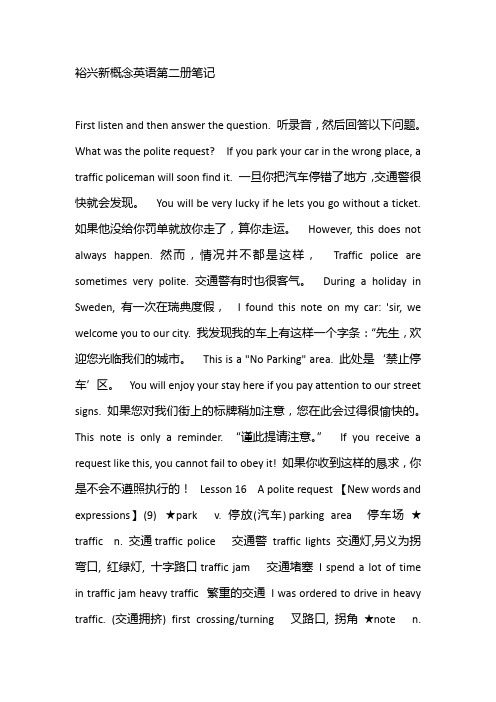
裕兴新概念英语第二册笔记First listen and then answer the question. 听录音,然后回答以下问题。
What was the polite request? If you park your car in the wrong place, a traffic policeman will soon find it. 一旦你把汽车停错了地方,交通警很快就会发现。
You will be very lucky if he lets you go without a ticket. 如果他没给你罚单就放你走了,算你走运。
However, this does not always happen. 然而,情况并不都是这样,Traffic police are sometimes very polite. 交通警有时也很客气。
During a holiday in Sweden, 有一次在瑞典度假,I found this note on my car: 'sir, we welcome you to our city. 我发现我的车上有这样一个字条:“先生,欢迎您光临我们的城市。
This is a "No Parking" area. 此处是‘禁止停车’区。
You will enjoy your stay here if you pay attention to our street signs. 如果您对我们街上的标牌稍加注意,您在此会过得很愉快的。
This note is only a reminder. “谨此提请注意。
”If you receive a request like this, you cannot fail to obey it! 如果你收到这样的恳求,你是不会不遵照执行的!Lesson 16 A polite request 【New words and expressions】(9)★park v. 停放(汽车)parking area 停车场★traffic n. 交通traffic police 交通警traffic lights 交通灯,另义为拐弯口, 红绿灯, 十字路口traffic jam 交通堵塞I spend a lot of time in traffic jam heavy traffic 繁重的交通I was ordered to drive in heavy traffic. (交通拥挤) first crossing/turning 叉路口, 拐角★note n.便条;n. 纸条, 纸钞make notes 做笔记message n. 消息★area n. 地段area n. 场地, 地段(一块对方), 大地点, 小地点都可以place n. 地点region n. 地区(交战, 开火)In this region, there were a lot of wars. 战火连绵★reminder n. 提示(可以指人,也可以指物, remind v. 提示, 提醒remind sb. of sth. You remind me of your mother. remind sb. to do sth. ★fail v. 无视, 忘记,失败①vi. 失败fail+宾语做某事失败fail (in) doing sth. 在某些方面失败(in 可省略) He failed (in) examination. ②vi. 不及格③vt. 使……不及格The teacher said he would fail me if I don’t work harder. ④vt. 未能……,不能……,忘记……(后接不定式)fail to do sth. 没有能够做某事,忘记做……not fail to do sth. 一定能够某事You can not fail to drive it. 你一定能够驾驶If you arrived in Beijing, you cannot fail to find the New Oriental School. 【课文讲解】1、If you park your car in the wrong place, a traffic policeman will soon find it. 英语中指每个人/任何人的不定代词通常是one,但在日常会话中,非正式的you更为常用。
裕兴新概念英语第二册笔记
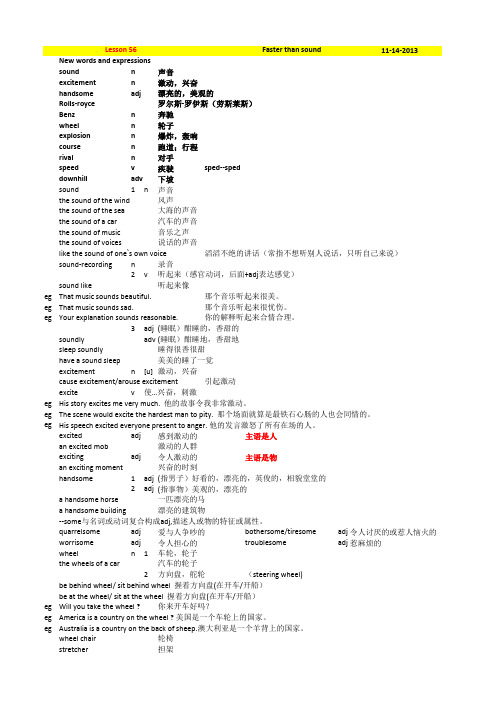
11-14-2013sound n 声音excitement n 激动,兴奋handsome adj Rolls-royce Benz n wheel n 轮子explosion n course n 跑道;行程rival n 对手speed v 疾驶sped--sped downhill adv 下坡sound 1n 声音the sound of the wind 风声the sound of the sea 大海的声音the sound of a car 汽车的声音the sound of music 音乐之声the sound of voices 说话的声音like the sound of one`s own voice 滔滔不绝的讲话(常指不想听别人说话,只听自己来说)sound-recording n 录音2v sound like 听起来像egThat music sounds beautiful.那个音乐听起来很美。
egThat music sounds sad.那个音乐听起来很忧伤。
egYour explanation sounds reasonable.你的解释听起来合情合理。
3adj soundly adv sleep soundly 睡得很香很甜have a sound sleep 美美的睡了一觉excitement n [u]激动,兴奋cause excitement/arouse excitement 引起激动excite v egHis story excites me very much. 他的故事令我非常激动。
egThe scene would excite the hardest man to pity. 那个场面就算是最铁石心肠的人也会同情的。
egHis speech excited everyone present to anger. 他的发言激怒了所有在场的人。
裕兴新概念英语第二册笔记
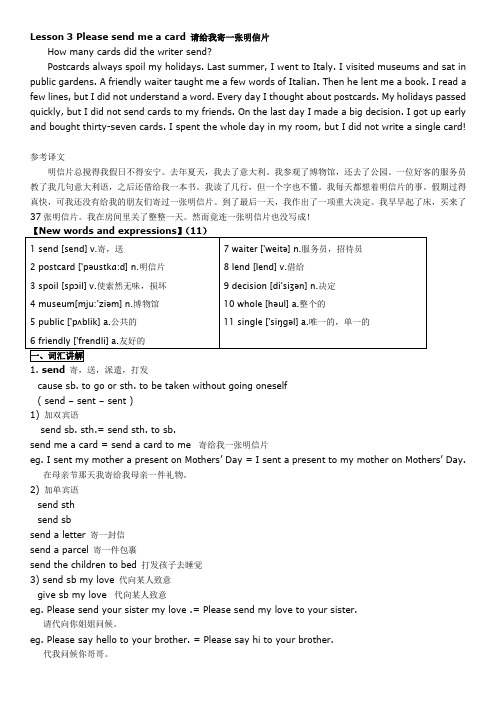
Lesson 3 Please send me a card 请给我寄一张明信片How many cards did the writer send?Postcards always spoil my holidays. Last summer, I went to Italy. I visited museums and sat in public gardens. A friendly waiter taught me a few words of Italian. Then he lent me a book. I read a few lines, but I did not understand a word. Every day I thought about postcards. My holidays passed quickly, but I did not send cards to my friends. On the last day I made a big decision. I got up early and bought thirty-seven cards. I spent the whole day in my room, but I did not write a single card!参考译文明信片总搅得我假日不得安宁。
去年夏天,我去了意大利。
我参观了博物馆,还去了公园。
一位好客的服务员教了我几句意大利语,之后还借给我一本书。
我读了几行,但一个字也不懂。
我每天都想着明信片的事。
假期过得真快,可我还没有给我的朋友们寄过一张明信片。
到了最后一天,我作出了一项重大决定。
我早早起了床,买来了37张明信片。
我在房间里关了整整一天。
然而竟连一张明信片也没写成!1. send寄,送,派遣,打发cause sb. to go or sth. to be taken without going oneself( send – sent – sent )1) 加双宾语send sb. sth.= send sth. to sb.send me a card = send a card to me 寄给我一张明信片eg. I sent my mother a present on Mothers’ Day = I sent a present to my mother on Mothers’ Day.在母亲节那天我寄给我母亲一件礼物。
裕兴新概念英语第二册笔记---第五课
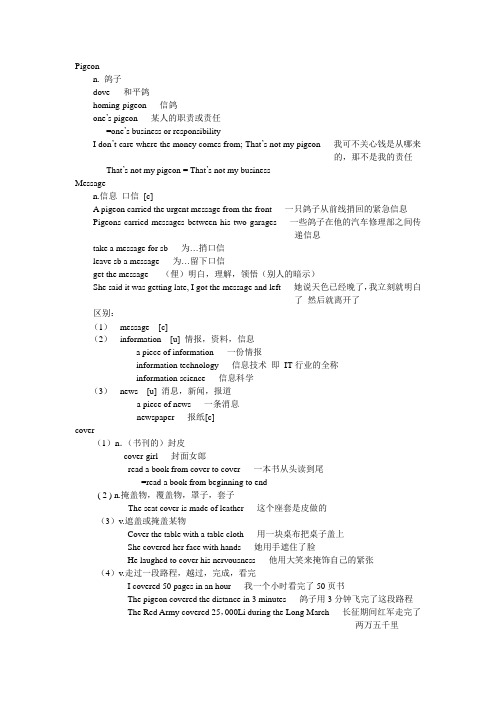
Pigeonn. 鸽子dove 和平鸽homing-pigeon 信鸽one’s pigeon 某人的职责或责任=one’s business or responsibilityI don’t care where the money comes from; That’s not my pigeon 我可不关心钱是从哪来的,那不是我的责任That’s not my pigeon = That’s not my businessMessagen.信息口信[c]A pigeon carried the urgent message from the front 一只鸽子从前线捎回的紧急信息Pigeons carried messages between his two garages 一些鸽子在他的汽车修理部之间传递信息take a message for sb 为…捎口信leave sb a message 为…留下口信get the message (俚)明白,理解,领悟(别人的暗示)She said it was getting late, I got the message and left 她说天色已经晚了,我立刻就明白了然后就离开了区别:(1)message [c](2)information [u] 情报,资料,信息a piece of information 一份情报information technology 信息技术即IT行业的全称information science 信息科学(3)news [u] 消息,新闻,报道a piece of news 一条消息newspaper 报纸[c]cover(1)n.(书刊的)封皮cover-girl 封面女郎read a book from cover to cover 一本书从头读到尾=read a book from beginning to end( 2 ) n.掩盖物,覆盖物,罩子,套子The seat cover is made of leather 这个座套是皮做的(3)v.遮盖或掩盖某物Cover the table with a table cloth 用一块桌布把桌子盖上She covered her face with hands 她用手遮住了脸He laughed to cover his nervousness 他用大笑来掩饰自己的紧张(4)v.走过一段路程,越过,完成,看完I covered 50 pages in an hour 我一个小时看完了50页书The pigeon covered the distance in 3 minutes 鸽子用3分钟飞完了这段路程The Red Army covered 25,000Li during the Long March 长征期间红军走完了两万五千里Distancen.距离,行距It’s a great distance from here. 那里离着很远It’s some distance from here 那里离这相当远It’s no distance from here 那里离这不远The church is within walking distance from my home 那个教堂离我家不远走路就能到了keep one’s distance from others 保持距离A British always keeps his distance from others 英国人总是和别人保持一定距离in the distance :far away 远方,远处,在远方distant adj.远隔的,遥远的或远亲的a distant village 一个遥远的小村庄=a remote villageRequestn./v.要求请求1)n. request for sth 对…的要求,请求make repeated requests for help 一再发出求救的要求at sb’s request 应…的请求at sb’s invitation 应…的邀请2)v. request sth from sb 向…要=request sth of sbThe boy requested pocket money from his parents 这个男孩向父母要零花钱request sb to do sth 要求…做(formal 多用于被动式)want sb to do sth 想让…做ask sb to do sth 让…做Dear Sir,I have been requested to inform you that…敬启者,兹通知阁下…Spare1)adj. 多余的,剩余的,备用的spare parts 备件Do you have a spare wheel in your car?你车上有没有备用轮胎We have a spare room in the flat 我们公寓里有个备用的房间I have no spare money to lend you 我没有闲钱借给你2)adj. 空闲的,未占用的I have no spare time this month 这个月我没有空3)v. 饶恕,宽恕spare sb (let sb off)Spare me,please,I won’t do it again 求求你饶过我吧,我再也不敢了4)v. (为某人某事)提供(时间,金钱),拨出,分出Can you spare me a few minutes?你能借给我几分钟时间吗?I have no time to spare now 我现在没有任何空闲时间形容词spare和动词to spare的区别:I cannot spare the time. 我花不起时间I have no time to spare 我没有时间I cannot buy spare parts for this car 我买不起这辆车的备件There is a spare room in this house 在这栋房子里有一间空房Caligula spared the slave’s life 卡里格勒饶恕了那个奴隶的命Servicen. 业务服务service center 服务中心banking and insurance service 银行及保险业务telephone service 电话业务his service to the country 他为祖国做出的贡献bear’s service 帮倒忙serve v. 为谁服务serve sb 为…服务serve the people 为人民服务serve the customers 为顾客服务garage1)车房,汽车库,汽车间a house with a separate garage 另设汽车房的房子a house with a built garage 附设汽车房的房子2)(兼做汽车维修等的)加油站a garage mechanic 加油站技术工人one … another 一个,…又一个one … the other (两者中的)一个,另一个On the one hand…; on the other hand 一方面;另一方面(用以引导出相互矛盾的观点,意见等)On the one hand you accept his gift ; on the other hand, you are rude to him. What really is your attitude to him? 一方面你接受他的礼物,另一方面你对他又那么粗鲁,你到底什么态度啊?I have two brothers. One is 16,and the other is 12.我有两个弟弟,一个16岁一个12岁I don’t like this shirt. Give me another 我不喜欢这件衬衫,请给我另外一件Would you like to have another piece of apple pie? 再来一块苹果派吗?Carry(take from one place to the other)搬提拿抱抬背运送等He was carrying a box on his shoulder 他扛着一个箱子from … to …从…到…from 9 o’clock am to 5 o’clock pm 从早9点到晚5点from morning to night 从早到晚=from morning till nightfrom door to door 挨门挨户的I am looking for my dog from door to door 我在挨门挨户的找我的狗from China to Peru(秘鲁)遍天下处处I have friends from China to Peru 我的朋友遍天下from hand to mouth 仅够糊口,现挣现花up to now:up till nowso farup to present通常搭配现在完成时up to/till 到…为止,知道…Up to the fourth night we had experienced no bad weather 一直到第四个晚上我也没有遇到恶劣的天气It’s up to you 由你决定(口)a great many + (pl.) 谓语动词复数a number of + (pl.)谓语动词复数many a + 单数可数n. 谓语动词单数Many a student is fond of films 许多学生都喜欢电影Otherpron.1)(做定语)另外的,别的,其他的I’m busy now;ask me about it some other time 我现在忙着呢,你其他时间再来问我吧There are other ways of doing it 还有其他方法做这件事情2)(做主语或宾语)另一个,另外(几个);另外的人或物We got home by 6 o’clock,but the others didn’t get back until about 8 o’clock我们六点钟就到家了,其他人8点钟才回来Some like milk chocolate,others prefer plain chocolate有些人喜欢牛奶巧克力,另一些人喜欢纯巧克力What I say goes in at one ear and out at the other我所说的话一只耳朵进一只耳朵出Urgentadj. 紧急的,迫切的an urgent message 紧急情况an urgent case 紧急情况an urgent cry 紧急呼救urgency n. [u] 紧急迫切This is a problem of great urgency 这是一个非常紧急的问题Own1)v. 拥有have ;possess2)adj. 自己的,个人的I dream of owning my own house 我梦想着有自己的房子I saw it with my own eyes 我亲眼看到的Our children have grown up and have children of their own我们的孩子已经长大了,而且还有了他们自己的孩子Mind your own business 管好你自己的事in the wayPlease move this chair. It’s in the way 请挪一下这把椅子,它把路挡着了Do your work in the way I have shown you 用我教你地方法来做这工作On the wayOn the way to the station,I bought some chocolate在去车站的路上我买了一些巧克力on the way home 在回家的路上on the way to school 在去上学的路上on the way to work 在上班的路上in this way用这种方式He saves old envelopes. In this way,he has collected a great many stamps他收集旧的信封,用这种方式他收集了大量的邮票in that way用那种方式by the way顺便问一句By the way,have you seen Harry recently?顺便问一下,你最近见过哈利吗?In a way在某种意义上In a way,it is an important book 在某种意义上来讲,这是一本很重要的书get one’s own way随心所欲。
裕兴新概念英语第二册笔记打印版本教学教材

裕兴新概念英语第二册笔记打印版本Lesson 1 A private conversation【New words and expressions】★private① adj. 私人的private life 私生活 private school 私立学校② adj. 普通的 private citizen 普通公民I’m a private citizen. (citizen n. 公民)private soldier 大兵《Private Ryan》《拯救大兵瑞恩》)public adj. 公众的,公开的(private的反义词)public school 公立学校 public letter 公开信public place 公共场所 privacy n.隐私It’s privacy. 这是我的隐私!(不愿让别人知道的)★conversation n.谈话have a + talk/chat/dialogue/conversation/gossip 名词变动词conversation 一般用于正式文体中, 内容上往往不正式subject of conversation 话题They are having a conversation.talk 内容可正式可不正式, 也可以私人Let’s have a talk.dialogue 对话, 可以指正式国家与国家会谈China and Korea are having a dialogue.chat 闲聊,就是北京人说的“侃”,无关紧要的事。
gossip 嚼舌头, 说长道短★theatre n.剧场, 戏剧cinema n.电影院★seat n.座位have a good seat/place,这里的seat指place(指地点),而不是chair.take a seat/take your seat 坐下来, 就坐Is the seat taken? 这个位置有人吗?请坐的3种说法 :Sit down, please. (命令性)Take your seat, please.Be seated, please. (更礼貌)作为动词的seat与sit的区别sit(sat,)vi. 就座He is sitting there.他坐在那儿。
裕兴 新概念第二册02笔记
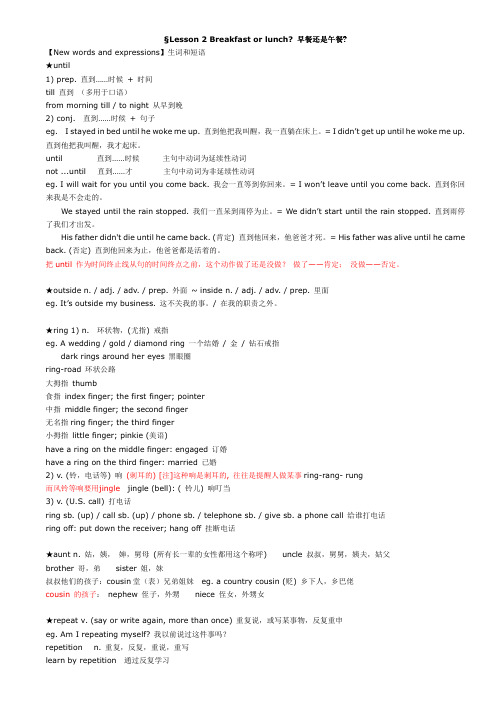
§Lesson 2 Breakfast or lunch?早餐还是午餐早餐还是午餐? ? ?【New words and expressions】生词和短语★until1) prep. 直到……时候+ 时间till 直到(多用于口语)from morning till / to night 从早到晚2) conj. 直到……时候+ 句子eg. I stayed in bed until he woke me up. 直到他把我叫醒,我一直躺在床上。
= I didn’t get up until he woke me up.直到他把我叫醒,我才起床。
until 直到……时候主句中动词为延续性动词not ...until 直到……才主句中动词为非延续性动词eg. I will wait for you until you come back. 我会一直等到你回来。
= I won’t leave until you come back. 直到你回来我是不会走的。
We stayed until the rain stopped. 我们一直呆到雨停为止。
= We didn’t start until the rain stopped. 直到雨停了我们才出发。
His father didn't die until he came back. (肯定) 直到他回来,他爸爸才死。
= His father was alive until he came back. (否定) 直到他回来为止,他爸爸都是活着的。
把until 作为时间终止线从句的时间终点之前,这个动作做了还是没做?做了——肯定;没做——否定。
★outside n. / adj. / adv. / prep. 外面~ inside n. / adj. / adv. / prep. 里面eg. It’s outside my business. 这不关我的事。
裕兴新概念英语第二册笔记 课文讲解
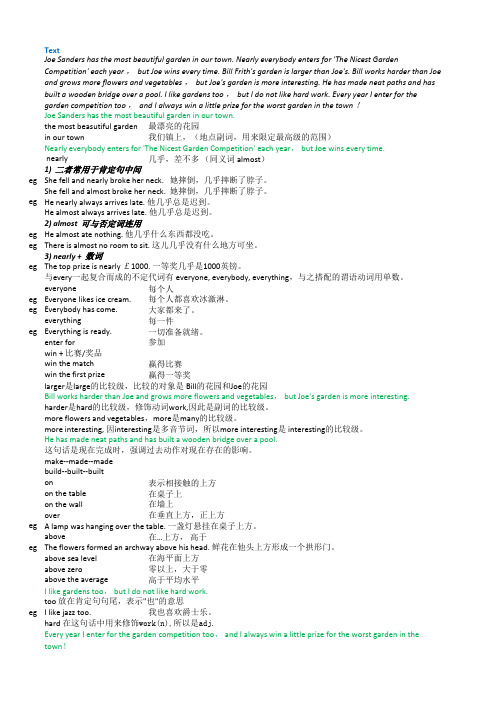
Text Joe Sanders has the most beautiful garden in our town.the most beasutiful garden 最漂亮的花园in our town 我们镇上,(地点副词,用来限定最高级的范围)Nearly everybody enters for 'The Nicest Garden Competition' each year , but Joe wins every time. nearly 几乎,差不多 (同义词 almost )1) 二者常用于肯定句中间egShe fell and nearly broke her neck. 她摔倒,几乎摔断了脖子。
She fell and almost broke her neck. 她摔倒,几乎摔断了脖子。
egHe nearly always arrives late. 他几乎总是迟到。
He almost always arrives late. 他几乎总是迟到。
2) almost 可与否定词连用egHe almost ate nothing. 他几乎什么东西都没吃。
egThere is almost no room to sit. 这儿几乎没有什么地方可坐。
3) nearly + 数词egThe top prize is nearly £1000. 一等奖几乎是1000英镑。
与every 一起复合而成的不定代词有 everyone, everybody, everything ,与之搭配的谓语动词用单数。
everyone 每个人egEveryone likes ice cream. 每个人都喜欢冰激淋。
egEverybody has come. 大家都来了。
everything 每一件事,每一egEverything is ready. 一切准备就绪。
enter for 参加win + 比赛/奖品win the match 赢得比赛win the first prize 赢得一等奖larger 是large 的比较级,比较的对象是 Bill 的花园和Joe 的花园Bill works harder than Joe and grows more flowers and vegetables , but Joe's garden is more interesting.harder 是hard 的比较级,修饰动词work,因此是副词的比较级。
裕兴新概念英语第二册笔记---Lesson 2

untilprep. 直到…时候till 直到(口语)I sometimes stay in bed until lunchtimeThe street is full of cars from morning till/to night. 从早到晚这条街都挤满了车辆conj. 直到…时候(后面接句子)I stayed in bed until be woke me up. 我一直躺在床上,直到他把我叫醒I didn’t get up until he woke me up. 直到他叫我,我才起床注:until 当主句中动词为延续性动词not …until 当主句中的动词为非延续性动词eg. I will wait for you until you come back. 我会一直等到你回来I won’t leave until you come back 你回来之前我不会离开outsiden./adj./adv./prep. 外面n. the outside of the houseadj. an outside toilet 户外厕所outside help 外来的帮助adv. It was dark outside 外面很黑Please wait outside 请在外面等候Don’t go outside because it’s too coldprep. It’s outside my business 这不关我的事反义词:inside n./adj./adv./prep.ringn. 环状物(尤指)戒指a wedding ring 结婚戒指a diamond ring 钻石戒指a gold ring 金戒指dark rings around her eyes 黑眼圈ring-road 环状公路ring finger 无名指大拇指:thumb食指:index fingerthe first fingerpointer中指:middle fingerthe second finger无名指:ring fingerthe third finger小拇指:little fingerpinkiev. (铃电话等)响ring – rang – rangThe door bell rang just now. 刚刚门铃响了I rang the bell. 我按下了门铃Will you answer the phone when it rings?电话响的时候你去接好吗?v. 打电话ring sb(up)给某人打电话=call sb (up)=phone sb=telephone sb=give sb a phone callI will ring you later. 我迟些给你打电话ring off :挂断电话He rang off before I could explain. 我还没解释呢,他就挂断了电话auntn.姑姨婶舅母uncle n. 叔叔舅舅姨夫姑父brother 哥弟sister 姐妹nephew 侄女外甥niece 侄女外甥女cousin 堂(表)兄弟姐妹a country cousin (贬)乡下人乡巴佬repeatv. 重复说或写某物反复重申“I’m having breakfast” I repeatedI repeated the question several times. 这个问题我都重复好几遍了Am I repeating myself?我以前说过这事?repetition n. 重复重说重写neveradv. 从未未成永不I have never been abroad. 我从未出过国Would you do that?你会做那件事吗?Never 绝对不会I never get up before 10 o’clock in mornings. 上午10点之前我从不起床Never fear 不要害怕Never give up 永不放弃Never say die 永不言败Never lose heart 绝不要灰心丧气earlyadj./adv.an early morning 一大早The early bird catches the worm. 早起的鸟有虫吃I got up early this morning. 今天我起的很早get up 起床go to bed 去睡觉fall asleep 睡着了=go to sleepstay up late 熬夜latelyadv.最近Have you been abroad lately?你最近出国了吗?I bought a new car lately. 我最近买了一辆新车注:lately通常用在现在完成时和一般过去时中look out of 向…外看look out of windowlook out of doorlook into(1)向…里看look into the box(2)调查The police are looking into the case. 警察正在查这件案子Look out!小心Look out!The car early knocked you over. 小心,那辆车差点撞到你What a terrible day!多糟糕的天那What a wonderful day!多好的天啊=What a lovely day!=What a beautiful day!Just then = at the moment 就在那一刻I came here on foot. 我走来的=I walked hereby bus/train/plane(air)/ship(sea water)表示交通方式用by直接加交通工具take a bus/train/plane(air)/ship(sea water)强调动作本身用“take a”加交通工具eg. In order to go to school on time I took a taxi. 为了准时去上学,我打了一辆出租车have breakfastlunchdinnerhave a meal 吃一顿饭Dear me!天呐(Br.)My god!天呐(Am.)it 做虚主语It’s one o’clock 时间It’s cold in winter 气候It’s only me 人It’s a long way from here 距离It’s very dirty here 环境感叹句引导感叹句的词只有:what 修饰名词,强调名词本身how 修饰adj. adv.表示程度结构一:What + a/an (+ adj.) + 可数名词单数(+主语+谓语)!注:如果没有形容词,大多指坏得方面,有时也需要看语境语气结构二:What + adj. + 可数名词复数/ 不可数名词(+主语+——谓语)!结构三:How + adj./adv. (+主语+谓语)结构四:How + adj. + a/an +可数名词单数+ (主语+谓语)注:如果没有adj. 或adv.就不能用how 引导复数名词一般有what 引导Eg.(1)This is a wonderful garden.What a wonderful garden this is!How wonderful a garden this is!(2)This is a surprise.What a surprise this is!(不能用how 引导,因为没有adj. adv.)(3)He is causing a lot of trouble.What a lot of trouble he is causing!(4)They are wonderful actors.What wonderful actors they are!(复数名词一般用what 引导)(5)She is a hard-working woman.What a hard-working woman she is!How hard-working a woman she is!(6)It is a tall building.What a tall building it is!How tall a building it is!(7)It is a terrible film.What a terrible film it is!How terrible a film it is!(8)Y ou are a clever boy.What a clever boy you are!How clever you are!(9)She is a pretty girl.What a pretty girl she is!How pretty a girl she is(10)H e is a strange guy.What a strange guy he is!How strange a guy he is!(11)S he is a lovely girl.What a lovely girl she is!How lovely a girl she is!(12)T his is an interesting play.What an interesting play this is!How interesting an play this is!(13)H e is a rude fellow.What a rude fellow he is!How rude a fellow he is!。
裕兴新概念英语第二册笔记 课文讲解
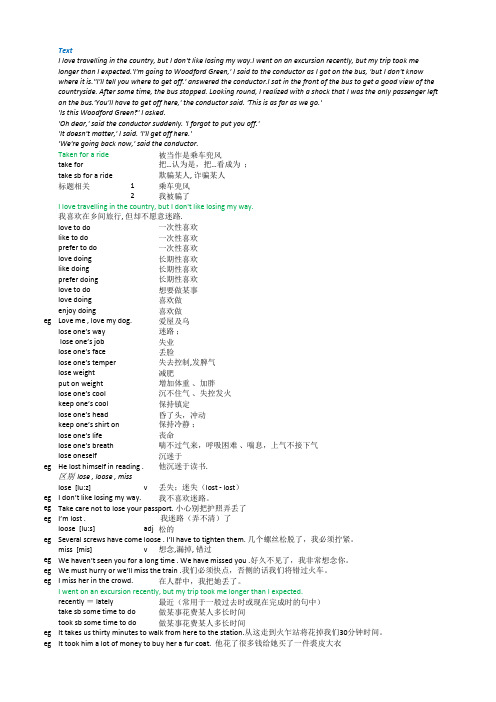
TextI love travelling in the country, but I don't like losing my way.I went on an excursion recently, but my trip took melonger than I expected.'I'm going to Woodford Green,' I said to the conductor as I got on the bus, 'but I don't know where it is.''I'll tell you where to get off.' answered the conductor.I sat in the front of the bus to get a good view of the countryside. After some time, the bus stopped. Looking round, I realized with a shock that I was the only passenger left on the bus.'You'll have to get off here,' the conductor said. 'This is as far as we go.''Is this Woodford Green?' I asked.'Oh dear,' said the conductor suddenly. 'I forgot to put you off.''It doesn't matter,' I said. 'I'll get off here.''We're going back now,' said the conductor.Taken for a ride 被当作是乘车兜风take for 把…认为是,把…看成为;take sb for a ride 欺骗某人, 诈骗某人标题相关 1乘车兜风2我被骗了I love travelling in the country, but I don't like losing my way.我喜欢在乡间旅行, 但却不愿意迷路.love to do一次性喜欢like to do一次性喜欢prefer to do一次性喜欢love doing长期性喜欢like doing长期性喜欢prefer doing长期性喜欢love to do 想要做某事love doing 喜欢做enjoy doing 喜欢做eg Love me , love my dog. 爱屋及乌lose one’s way 迷路;lose one’s job 失业lose one’s face 丢脸lose one’s temper 失去控制,发脾气lose weight减肥put on weight 增加体重、加胖lose one’s cool 沉不住气、失控发火keep one’s cool保持镇定lose one’s head 昏了头,冲动keep one’s shirt on 保持冷静;lose one’s life丧命lose one’s breath 喘不过气来,呼吸困难、喘息,上气不接下气lose oneself 沉迷于eg He lost himself in reading . 他沉迷于读书.区别 lose , loose , misslose [lu:z] v丢失;迷失(lost - lost)eg I don’t like losing my way.我不喜欢迷路。
第二册课新概念笔记
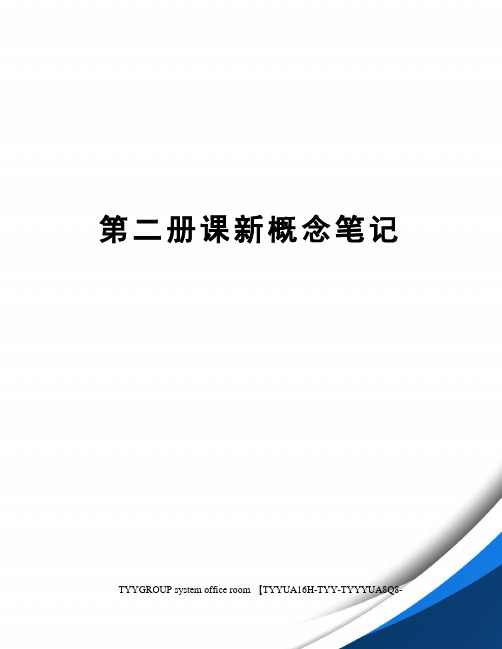
第二册课新概念笔记 TYYGROUP system office room 【TYYUA16H-TYY-TYYYUA8Q8-裕兴新概念英语第二册笔记第二十二课单词学习dreamdream---dreamed---dreamed / dreamt---dreamt---dreamt区别:在英式英语中用不规则变化;在美式英语中用规则变化。
1) n.梦,梦想eg. Have a good dream.祝你做个好梦。
/ Have a sweet dream.Have a bad dream.做恶梦。
eg. Life is a dream.人生如梦,世事无常。
eg. He realized his dream at last.他终于实现了自己的梦想。
eg. His dream was realized at last.他的梦想终于实现了。
/His dream came true at last.dream-boat?梦中情人(梦寐以求的东西)Mr. Right?白马王子2) n.(口)美好的事物,美丽的东西(梦一般的)eg. Your dress is a perfect dream.你的裙子真美啊。
perfect[pfkt; (for v.) pfekt] adj. 完美的;最好的;3) v.做梦,幻想,梦想dream of sth?梦想得到某物dream of doing sth?梦想做某事/dream about sth/dream about doing stheg. I never promised to lend you my car, you must be dreaming.我从来没答应过把车借给你,你一定在做梦。
eg. He dreamed of becoming president one day.他梦想有一天会成为总统。
president ['prezd()nt] n. 总统;董事长;校长eg. I never dreamed of receiving a rise.我从来没有想过会涨工资。
(完整版)裕兴新概念英语第二册笔记完美打印版

Lesson 1 A private conversation【New words and expressions】★private① adj. 私人的private life 私生活private school 私立学校② adj. 普通的private citizen 普通公民I’m a private citizen. (citizen n. 公民)private soldier 大兵《Private Ryan》《拯救大兵瑞恩》) public adj. 公众的,公开的(private的反义词)public school 公立学校public letter 公开信public place 公共场所privacy n.隐私It’s privacy. 这是我的隐私!(不愿让别人知道的)★conversation n.谈话have a + talk/chat/dialogue/conversation/gossip 名词变动词conversation 一般用于正式文体中, 内容上往往不正式subject of conversation 话题They are having a conversation.talk 内容可正式可不正式, 也可以私人Let’s have a talk.dialogue 对话, 可以指正式国家与国家会谈China and Korea are having a dialogue.chat 闲聊,就是北京人说的“侃”,无关紧要的事。
gossip 嚼舌头, 说长道短★theatre n.剧场, 戏剧cinema n.电影院★seat n.座位have a good seat/place,这里的seat指place(指地点),而不是chair.take a seat/take your seat 坐下来, 就坐Is the seat taken? 这个位置有人吗?请坐的3种说法:Sit down, please. (命令性)Take your seat, please.Be seated, please. (更礼貌)作为动词的seat与sit的区别sit(sat,)vi. 就座He is sitting there.他坐在那儿。
裕兴新概念英语第二册笔记
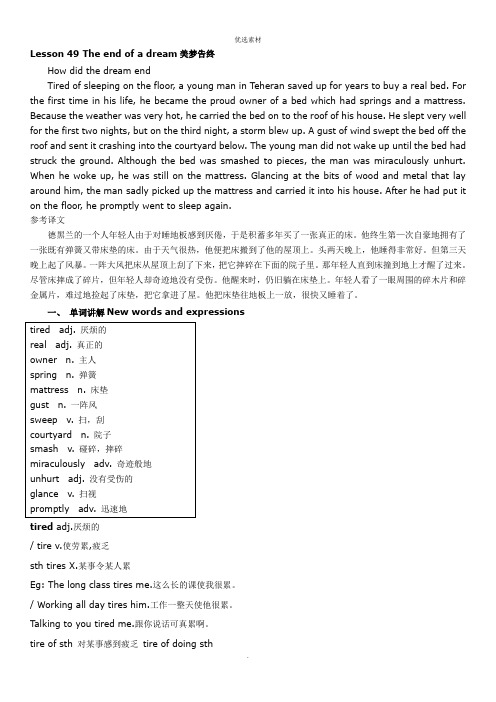
Lesson 49 The end of a dream美梦告终How did the dream endTired of sleeping on the floor, a young man in Teheran saved up for years to buy a real bed. For the first time in his life, he became the proud owner of a bed which had springs and a mattress. Because the weather was very hot, he carried the bed on to the roof of his house. He slept very well for the first two nights, but on the third night, a storm blew up. A gust of wind swept the bed off the roof and sent it crashing into the courtyard below. The young man did not wake up until the bed had struck the ground. Although the bed was smashed to pieces, the man was miraculously unhurt. When he woke up, he was still on the mattress. Glancing at the bits of wood and metal that lay around him, the man sadly picked up the mattress and carried it into his house. After he had put it on the floor, he promptly went to sleep again.参考译文德黑兰的一个人年轻人由于对睡地板感到厌倦,于是积蓄多年买了一张真正的床。
裕兴新概念英语第二册笔记文讲解
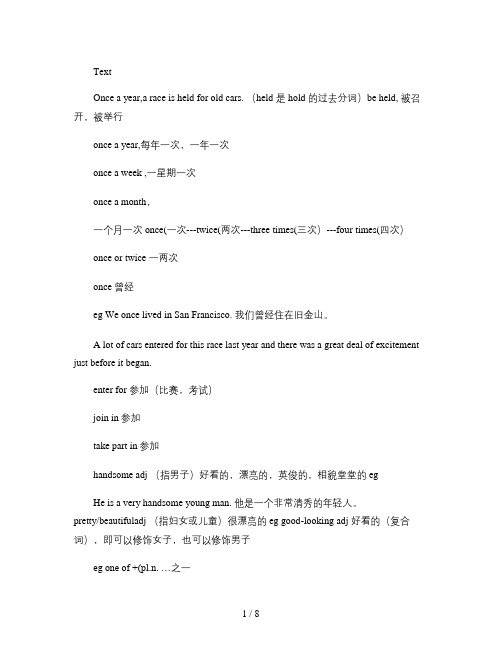
TextOnce a year,a race is held for old cars. (held 是hold 的过去分词)be held, 被召开,被举行once a year,每年一次,一年一次once a week ,一星期一次once a month,一个月一次once(一次---twice(两次---three times(三次)---four times(四次)once or twice 一两次once 曾经eg We once lived in San Francisco. 我们曾经住在旧金山。
A lot of cars entered for this race last year and there was a great deal of excitement just before it began.enter for 参加(比赛,考试)join in参加take part in参加handsome adj (指男子)好看的,漂亮的,英俊的,相貌堂堂的egHe is a very handsome young man. 他是一个非常清秀的年轻人。
pretty/beautifuladj (指妇女或儿童)很漂亮的eg good-looking adj 好看的(复合词),即可以修饰女子,也可以修饰男子eg one of +(pl.n. …之一The most unusual car was a Benz which had only three wheels.the most unusual 最不寻常的Built in 1885,it was the oldest car taking part.…taking part现在分词短语作定语修饰car take part 参加take part in+(宾语)参加…比赛,同意短语有,join in/ enter foreg The professor took no small part in thedispute. 在那次争论中,这位教授参与不少。
(完整版)裕兴新概念英语第二册笔记完美打印版

Lesson 1 A private conversation【New words and expressions】★private① adj. 私人的private life 私生活private school 私立学校② adj. 普通的private citizen 普通公民I’m a private citizen. (citizen n. 公民)private soldier 大兵《Private Ryan》《拯救大兵瑞恩》) public adj. 公众的,公开的(private的反义词)public school 公立学校public letter 公开信public place 公共场所privacy n.隐私It’s privacy. 这是我的隐私!(不愿让别人知道的)★conversation n.谈话have a + talk/chat/dialogue/conversation/gossip 名词变动词conversation 一般用于正式文体中, 内容上往往不正式subject of conversation 话题They are having a conversation.talk 内容可正式可不正式, 也可以私人Let’s have a talk.dialogue 对话, 可以指正式国家与国家会谈China and Korea are having a dialogue.chat 闲聊,就是北京人说的“侃”,无关紧要的事。
gossip 嚼舌头, 说长道短★theatre n.剧场, 戏剧cinema n.电影院★seat n.座位have a good seat/place,这里的seat指place(指地点),而不是chair.take a seat/take your seat 坐下来, 就坐Is the seat taken? 这个位置有人吗?请坐的3种说法:Sit down, please. (命令性)Take your seat, please.Be seated, please. (更礼貌)作为动词的seat与sit的区别sit(sat,)vi. 就座He is sitting there.他坐在那儿。
裕兴新概念第二册第二课
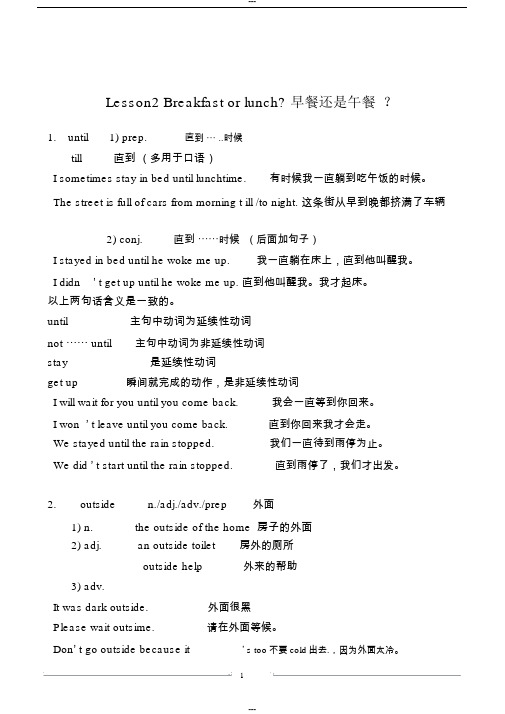
Lesson2 Breakfast or lunch? 早餐还是午餐?1. until1) prep.直到⋯..时候till直到(多用于口语)I sometimes stay in bed until lunchtime.有时候我一直躺到吃午饭的时候。
The street is full of cars from morning t ill /to night. 这条街从早到晚都挤满了车辆2) conj.直到⋯⋯时候(后面加句子)I stayed in bed until he woke me up.我一直躺在床上,直到他叫醒我。
I didn’ t get up until he woke me up.直到他叫醒我。
我才起床。
以上两句话含义是一致的。
until主句中动词为延续性动词not ⋯⋯ until主句中动词为非延续性动词stay是延续性动词get up瞬间就完成的动作,是非延续性动词I will wait for you until you come back.我会一直等到你回来。
I won ’ t leave until you come back.直到你回来我才会走。
We stayed until the rain stopped.我们一直待到雨停为止。
We did ’ t start until the rain stopped.直到雨停了,我们才出发。
2.outside n./adj./adv./prep外面1) n.the outside of the home 房子的外面2) adj.an outside toilet房外的厕所outside help外来的帮助3) adv.It was dark outside.外面很黑Please wait outsime.请在外面等候。
Don’ t go outside because it’ s too不要cold出去.,因为外面太冷。
- 1、下载文档前请自行甄别文档内容的完整性,平台不提供额外的编辑、内容补充、找答案等附加服务。
- 2、"仅部分预览"的文档,不可在线预览部分如存在完整性等问题,可反馈申请退款(可完整预览的文档不适用该条件!)。
- 3、如文档侵犯您的权益,请联系客服反馈,我们会尽快为您处理(人工客服工作时间:9:00-18:30)。
Lesson 2 Breakfast or lunch? 早餐或午餐?【New words and expressions】生词和短语(5)until prep. 直到outside adv. 外面ring(rang, rung)v. (铃、电话等)响aunt n. 姑,姨,婶,舅母repeat v. 重复一、单词讲解until1) prep. 直到…时候till 直到(多用于口语)eg. I sometimes stay in bed until lunchtime.有时候我一直躺到吃午饭的时候。
eg. The street is full of cars from morning till /to night.这条街从早到晚都挤满了车辆2) conj. 直到……时候(后面加句子)eg. I stayed in bed until he woke me up.我一直躺在床上,直到他叫醒我。
eg. I didn’t get up until he woke me up.直到他叫醒我。
我才起床。
以上两句话含义是一致的。
until 主句中动词为延续性动词not……until 主句中动词为非延续性动词stay 是延续性动词get up 瞬间就完成的动作,是非延续性动词eg. I will wait for you until you come back.我会一直等到你回来。
eg. I won’t leave until you come back.直到你回来我才会走。
eg. We stayed until the rain stopped.我们一直待到雨停为止。
eg. We didn’t start until the rain stopped.直到雨停了,我们才出发。
outside n./adj./adv./prep1) n. 外面eg. the outside of the home房子的外面2) adj. 外面的eg. an outside toilet房外的厕所eg. outside help外来的帮助3) adv. 在外面eg. It was dark outside.外面很黑eg. Please wait outsime.请在外面等候。
eg. Don’t go outside because it’s too cold.不要出去,因为外面太冷。
4) prep. 在范围之外eg. It’s outside my business.这不关我的事。
反义词:inside n./adj./adv. /prep.ring1) n. 环状物,(尤指)戒指a wedding ring 结婚戒指a diamond ring 钻戒a gold ring 金戒指dark rings around her eyes 黑眼圈ring-road 环状公路ring finger=the third finger 无名指大拇指:thumb食指:index finger = the first finger = pointer 中指:middle finger = the second finger无名指:ring finger=the third finger小拇指:little finger = pinkiehave a ring on the middle finger (engaged 订婚)have a ring on the third finger (married 已婚)2) (铃,电话等)响ring-----rang----rungeg.The door bell rang just now.刚刚门铃响了。
eg.I rang the bell.我按响了门铃。
eg.Will you answer the phone when it rings.电话铃响了,你去接电话好吗?3) v. ( U.S. call ) 打电话ring sb. (up) 给某人打电话call sb. (up) 给某人打电话phone sb.给某人打电话telephone sb. 给某人打电话give sb. a phone call 给某人打电话eg. I’ll ring you later.我会迟些给你打电话。
ring off/put down the receiver/hang off挂断电话eg. He rang off before I could explain.我还没解释,他就挂断电话aunt n. 姑,姨,婶,舅母uncle n. 叔叔,舅舅,姨夫,姑父brother n. 哥,弟sister n. 姐妹nephew n. 侄子,外甥niece n. 侄女,外甥女cousin n. 堂(表)兄弟姐妹eg. a country cousin.乡巴佬repeat v. 重复(say or write again , more than once) (贬)乡下人,乡巴佬eg.“I’m having breakfast .”I repeated.我重复说:“我正在吃早饭呢。
”eg.I repeated the question several times.这个问题我重复好几遍了。
eg.Am I repeating myself?我以前说过这件事吗?repetition n. 重复,反复,重说,重写learn by repetition通过反复学习二、关键句型Key structures ----一般现在时和现在进行时的用法(一)一般现在时1.动词构成:谓语动词使用动词原形;系动词为am, is, are 的形式。
主语是第三人称单数时,谓语动词需有变化:1)直接加“s”;gives /takes/ asks2)以辅音字母加”y”结尾的动词,变”y”为”I”,再加“es”; carry–carries3)以“o, s, x, ch, sh,”结尾的动词加“es”。
goes/dresses/ watches/brushes 2.功能:1)表达习惯性,规律性的动作eg. I never get up early on Sundays.星期天我从来都不早起。
I sometimes stay in bed until lunchtime.有时候我一直躺倒吃午饭的时间。
2)表达现在的事实状态或动作eg. We all like football.我们都喜欢足球。
Birds fly.鸟会飞。
This picture is of great value.这幅画具有极大的价值。
3)表达客观真理,格言警句或事实eg. The earth moves round the sun.地球绕着太阳转。
The sun rises in the east and sets in the west.太阳东升西落。
Two and two makes four.二加二等于四。
Seeing is believing.眼见为实。
2.经常搭配的副词:often/usually/every year/ occasionally/frequently/seldom sometimes/always…副词的位置:通常放在实义动词之前,助动词之后。
eg. He doesn’t always come by train.他不总是坐火车来。
Do you ever read in bed?你在床上躺着看过书吗?I never like jazz.我从来都不喜欢爵士乐。
He rarely gets up before 10 o’clock.在10 点之前他很少起床。
We frequently have lunch at this restaurant.我们总在这家餐馆吃饭。
(二)现在进行时1.构成:am / is /are + doing…2.功能:1) 表示现在,目前正在做某事,正在进行的动作。
eg. It is raining.正在下雨。
I am still having breakfast.我正在吃早饭。
What are you doing?你干吗呢?We are enjoying our lunch.我们正在享用午餐。
1)表示现阶段正在进行的动作。
eg. We are studying English this summer.今年夏天我们在学英语。
He is taking physics this semester.这一学期他正在学物理。
3.可用进行时态来表示即将开始的动作. go/come/leave/arrive/land/meet/ die/start/return/join…eg. I am coming to see you.我就来看你了。
The bus is coming.公共汽车就要来了。
The plane is leaving for Shanghai.飞机就要飞往上海了。
The old man is very ill and he is dying.这个老人病的非常严重,他现在就快要死了。
4.有些副词用在进行时中间,表示说话人带有感情色彩,如赞赏,厌恶等。
always/forever/continually/constantly…eg. He is always lying.他总是在说谎。
You are constantly complaining.你总是在抱怨。
The girl is always thinking of others.这个女孩总是考虑别人。
The naughty boy is continually making noises.这个淘气的孩子总是在制造噪音。
5.下列表示状态,感觉,情绪,精神活动的动词不用于进行时态。
用一般现在时。
believe/doubt/see/hear/know/understand/belong to/think/consider/ feel/look/seem/show/mind/have/sound/taste/require/possess/care/like/hate/ love/detest/desire…6.现在进行时通常搭配以下副词now/at present/at this time/these days.. ExerciseExercise A1.I am looking out of my window. I can see some children in the street. The children ________ (play) football. They always ________ (play) football in the street. Now a little boy ________ (kick) the ball. Anther boy ________ (run) after him but he cannot catch him.are playingplayis kickingis running2.I carried my bags into the hall. “What you ________ (do)?”my landladyasked. “I ________ (leave), Mrs. Lynch,”I answered. “Why you ________ (leave)?”she asked. “You have been here only a week.”“A week is too long, Mrs. Lynch,”I said. “There are too many rules in this house. My friends never ________ (come) to visit me. Dinner is always at seven o’clock, so I frequently ________ (go) to bed hungry. You don’t like noise, so I rarely ________ (listen) to the radio. The heating doesn’t work, so I always ________ (feel) cold. This is a terrible place for a man like me. Goodbye, Mrs. Lynch.”Landlady 女房东are you doingam leavingare you leavingcomegolistenfeelExercise B1.My friends never come to visit me.2.I frequently go to bed hungry.3.I rarely listen to the radio.4.I always feel cold.5.I never get up early on Sundays.6.I sometimes stay in bed until lunchtime.1.She answers my letters. (rarely)She rarely answers my letters.2.We work after six o’clock. (never)We never work after six o’clock.3.The shops close on Saturday afternoons. (always)The shops always close on Saturday afternoons.4.Do you go to work by car? (always)Do you always go to work by car?5.Our teacher collects our exercise books. (frequently)Our teacher frequently collects our exercise books.6.We spend our holidays abroad. (sometimes)We sometimes spend holidays abroad.7.I buy CDs. (often)I often buy CDs.8.Do you buy CDs? (ever)Do you ever buy CDs?【Text】课文It was Sunday. I never get up early on Sundays. I sometimes stay in bed until lunchtime. Last Sunday I got up very late. I looked out of the window. It was dark outside. 'What a day!' I thought. 'It's raining again.' Just then, the telephone rang. It was my aunt Lucy. 'I've just arrived by train,' she said. 'I'm coming to see you.' 'But I'm still having breakfast,' I said. 'What are you doing?' she asked. 'I'm having breakfast,' I repeated. 'Dear me,' she said. 'Do you always get up so late? It's one o'clock!'那是个星期天, 而在星期天我是从来不早起的, 有时我要一直躺到吃午饭的时候. 上个星期天, 我起得很晚. 我望望窗外, 外面一片昏暗. “鬼天气!”我想, “又下雨了. “正在这时, 电话铃响了. 是我姑母露西打来的. “我刚下火车, “她说, “我这就来看你.““但我还在吃早饭, “我说.“你在干什么?”她问道.“我正在吃早饭, “我又说了一遍.“天啊, “她说, “你总是起得这么晚吗?现在已经1 点钟了!”三.课文讲解1. It was Sunday. 过去式那是个星期天。
